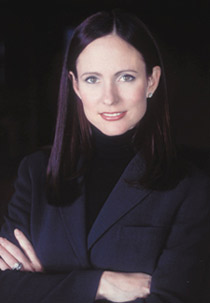 1. How is the role of the director changing in television?
1. How is the role of the director changing in television?
More so than ever, we are using directors as producers and sometimes even executive producers on our series. I think the role is changing because the quality of television has risen to such an extraordinary level. You can’t maintain that without someone in place on a show doing quality control in terms of the look of the show and having a relationship with the performers that’s consistent from episode to episode. The director is someone who has a shorthand with the crew and various department heads. They take a real leadership position on our shows.
2. A lot of feature directors are electing to work in television now. Do you see that as a trend that's going to continue?
Well, I do see it as a trend that will continue. I think for the most part we’re talking about involvement at the pilot stage as most feature directors are pretty intent on maintaining a feature career, which you can’t do if you’re committed exclusively to a television series. But in terms of the pilot process, you know pilots are intended to be sales tools and they’re bigger in scope than the episodic storytelling that follows. So it’s nice to have someone who’s been able to realize a very big script working with us on the television level, giving something a cinematic feel, which is what we’re looking for in a sales tool.
3. You're one of the highest ranking female executives in the business, but there's still a dearth of women behind the camera. Why do you think there's such a resistance to hiring female directors?
Well, I can only speak for our company. There isn’t resistance to hiring female directors. On the contrary, we’re constantly searching for women to fill director slots. I don’t really know what the problem has been. I will tell you as a woman myself, juggling a professional life and my responsibilities as a mother, the hours involved in directing are pretty extraordinary and it’s hard to have flexibility. When you’re the director you’re there 24/7. Really our difficulty has been finding women, not overcoming a reluctance to hire them.
4. Some people are under the misconception that reality shows direct themselves. How do you see the role of directors in that genre?
You know, the role of the director is pretty important. At the end of the day, great reality shows tell stories. There are characters. They’re cast incredibly well when they work and between how it’s shot and how it’s cut, that determines how compelling a story you can create. Unlike scripted shows where you know exactly what’s coming, you have to be open to anything happening. So I see the director’s role as being critical.
5. To what extent are heightened production values for a series like '24', which obviously costs more to put on the air, dependent on increased DVD revenue?
'24' was the first series, I believe, ever released on DVD just a year after it premiered. It was a function of the executives at our company really struggling with the issue of rising production costs and how much that show in particular cost to make, and not wanting to compromise. Out of that came the idea that we should release it on DVD, that it would be a revenue stream that would enable us to continue producing it at the level that we had become accustomed to in the first season. And it really enabled us to continue producing the show that’s on the air.
6. But in general, do you see the money from DVD sales as necessary to subsidize these higher-priced shows?
That’s an interesting question, because you can’t bank on a successful DVD. You see some really quality series that are released on DVD that underperform everyone’s expectation and you have to go back to the drawing board. The creative process is not as clinical as I would like it to be. Sometimes it’s just a matter of the right show at the right time slipping into the zeitgeist and becoming a phenomenon.
7. So has the bonanza of DVD sales for TV series had any effect on the production equation at all?
No, because again it’s not a reliable revenue source. You know, you sort of hope for it as we’re putting together our budgets and trying to decide how far we can stretch in any given show, you try to get a guess from the home entertainment area, but nobody wants to be overly aggressive because it’s still a very young marketplace. It’s not a certainty.
8. Speaking about other uncertainties, what do you think the future of programming on cell phones and iPods is?
That’s really a tough one. The only thing I know for certain is new technologies are offering us, as programmers and suppliers, a great opportunity to expose our shows to new people. So, to the extent that these are promotional opportunities, they’re fantastic and we are eager to explore any of them. In terms of what they mean as a business, we just don’t know.
9. So you don't see them as a primary opportunity?
That’s correct. They would never be. I mean, if you don’t have a branded series that has been launched on network or cable, you don’t have the other opportunities. It can’t start the other way around in my mind.
10. What effect do you think web downloads and iPods and cell phone viewing is going to have on revenue streams?
We’ve had very preliminary conversations with a couple of different networks about what a deal might look like, but everyone is still discovering what sort of opportunities exist. So it’s really premature to have negotiations about who’s going to get what piece of the pie when no one knows exactly what the pie’s going to look like.